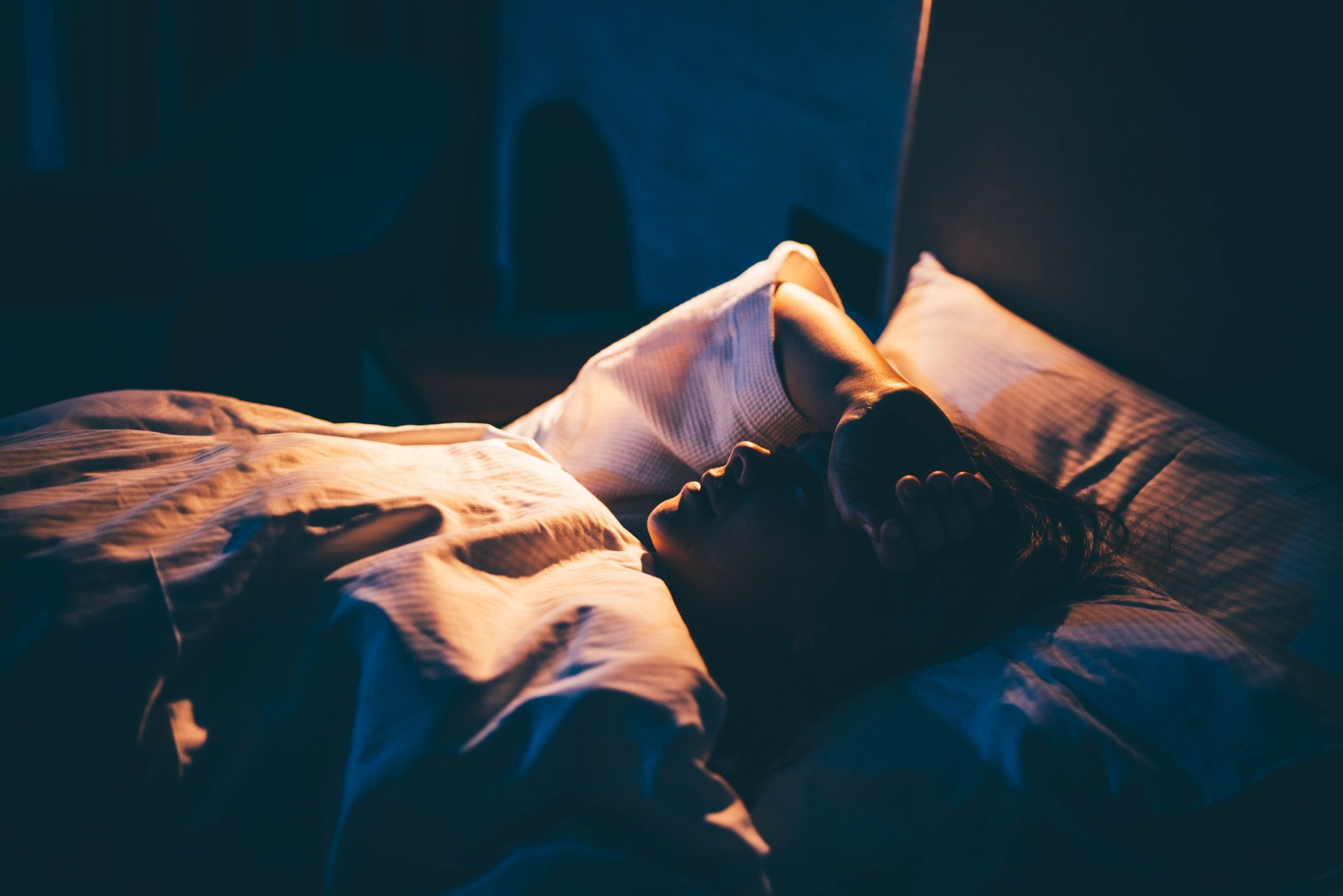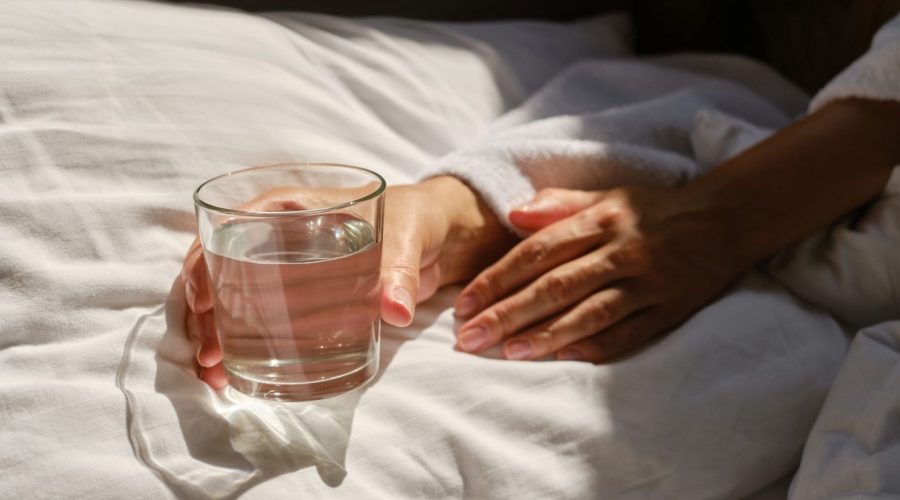“Am I the only one who wakes up every night for a glass of water?”
Do you wake up at night feeling parched? Got a mouth drier than the Sahara come morning? Here’s what two doctors have to say about night-time thirst.
It’s common practice to have a glass of water on your bedside table. It’s there in case you wake up coughing in the night, need to refresh on waking or if you’re feeling dry from too much mouth-breathing.
But if you’re anything like me, then that glass might not be enough. I wake up umpteen times a night feeling parched, and in the morning, my throat is positively sore from dryness. I drink a reasonable amount of water during the day but I’m desperately thirsty at night. Why are some of us so thirsty when we’re lying in bed, and what can we do about it?
You may also like
How drinking water can improve sleep and energy levels, according to experts
It’s impossible to say with any certainty why some people feel parched at different points in the day, but there are a few things that may explain night-time thirst:
Day-time dehydration
“Maybe you didn’t hydrate enough during the day,” suggests Dr Katharina Lederle, founder of Somnia, also pointing out that we lose a lot of water through sweating and perspiration even if we’re mainly sedentary. “If you are doing exercise, the need to hydrate appropriately increases even more.” If you’re constantly active (maybe you cycle or walk to work, are training for a long race, or spend most of the day on your feet) you may not realise how much liquid you’re losing.
“If you are more active, there is a greater chance you will have lost more moisture electrolytes during the day via sweating and mouth breathing during exercise, and as such, you may feel more thirsty in the evening,” confirms Dr Nirusa Kumaran, medical director and founder of Elemental Health Clinic.
Being too hydrated
I’ve heard the theory that by stopping yourself from drinking in the evening to prevent having to go for a midnight pee, but Dr Lederle suggests that doing that can leave us more thirsty. “What you eat and drink before bed can also make you thirsty.” So it might be worth checking the salt and sugar content of your evening meal and watching your alcohol consumption.
Wrong mattress
Got a fancy memory foam mattress? It might do wonders for your back but there’s also a chance that it could leave you feeling warmer than usual. “Foam mattresses can be great in cooling you down when you first get into bed, but they then reflect this heat back to you,” Dr Lederle says.

Respiration
“A common cause (of nocturnal thirst) is if you are a mouth breather,” says Dr Kumaran. “Mouth breathing encourages greater water loss from your mouth, making you feel excessively thirsty.
“Similarly, if you snore at night, this also encourages greater moisture loss via the upper airways.”
Poor sleep regimes and hygiene
Sleeping too little or for too long affects the body’s hydration levels – which in turn could make you more thirsty. A study of nearly 20,000 people in the US and China found that people who only sleep for six hours a night were found to have significantly higher rates of dehydration than those who slept for eight.
Dr Kumaran also flags that the temperature and humidity of your bedroom also plays a big role: “If the air in your room is too dry or excessively humid this can also make you feel thirsty.”
Anxiety
She also hypotheses that constantly needing a drink might not actually be to do with physical thirst at all. “I don’t have any scientific backing for this, but I wonder whether feeling anxious or stressed while you are sleeping can also affect thirst. You might not necessarily be thirsty, but it might be a safety behaviour to soothe yourself.”
That’s quite an interesting idea; those of us who have active jobs or stressful home lives probably do take that to bed with us, unless we’ve got a really decent meditation practice in place. While those things have an obvious impact on our sleep quality, it’s much less obvious to consider how we behave around bedtime.
And then, of course, we have more serious medical issues like diabetes, sleep apnoea, Sjogren Syndrome, kidney and liver disease, and cancer. But it’s worth saying that almost all of these come with a plethora of symptoms – night time thirst being just one.
Is waking up to drink at night an issue?
Dr Kumaran maintains that if you’re sufficiently hydrated, “one shouldn’t need to wake up to drink water” and that it’s important to understand why it’s happening.
But needing to wake up for a drink isn’t a problem in Dr Lederle’s eyes – so long as you’re essentially needing to wet the mouth rather than have a lot to drink: “Typically, you don’t actually drink that much water at night; a couple of sips and that’s it. However, if you find yourself regularly drinking pints during the night, then see your GP about it.”
She flags that it may be useful to keep an eye on how frequently you need to get up to pee in the night too. Nocturia (waking at night to urinate) is normal, “but if you find yourself waking a lot during the night to go to the toilet and/or passing a lot of urine, then it’s best to talk to your GP”.
What can we do to reduce our need to drink at night?
“You want to stay hydrated but not ‘overloaded’,” Dr Lederle says. She and Dr Kumaran recommend taking the following steps while acknowledging that it’s totally normal to wake at night and then to use the loo (something that actually becomes more common the older we are):
- Reduce the amount of water you drink in the hours before bed but by no means forbid yourself to have a sip of water.
- Stay hydrated during the day.
- Check the humidity/dryness of the air in your bedroom using a humidity meter
- Try to avoid alcoholic and sugary drinks, as well as caffeinated and energy drinks. Spicy/salty food can also make you extra thirsty.
- Some teas can be more diuretic than others, so pay attention to how your evening cup of tea affects you – switching to water if you think it is having an impact.
- Eat a balanced diet with foods that contain water which the body absorbs slowly while it is digesting (like fruit and veg).
- Book a GP appointment to rule out any medical reason.
For more hydration tips, visit the Strong Women Training Club.
Images: Getty
Source: Read Full Article
